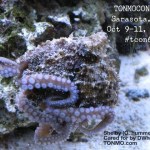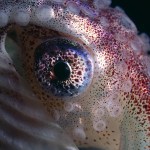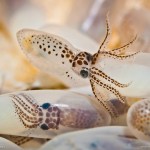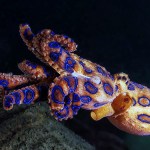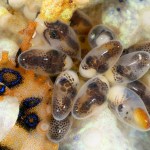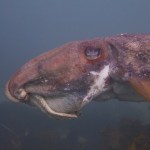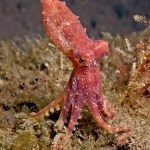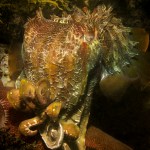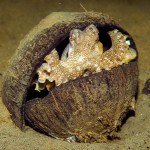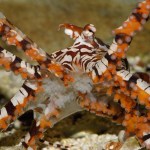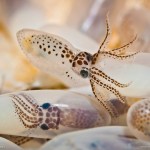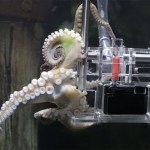cephalopods
a, Schematic of Octopus bimaculoides anatomy, highlighting the tissues sampled for transcriptome analysis: viscera (heart, kidney and hepatopancreas), yellow; gonads (ova or testes), peach; retina, orange; optic lobe (OL), maroon; supraesophageal brain (Supra), bright pink; subesophageal brain (Sub), light pink; posterior salivary gland (PSG), purple; axial nerve cord (ANC), red; suckers, grey; skin, mottled brown; stage 15 (St15) embryo, aquamarine. Skin sampled for transcriptome analysis included the eyespot, shown in light blue. b, C2H2 and protocadherin domain-containing gene families…
Oh, my…the meeting looks very interesting, especially that one titled "Cephalopod Neurogenomics: Insights into the evolution of complex brains". Can I escape to Florida that early in the semester? Can I afford it? My schedule and my wallet are moaning "noooooo…"
Divers discovered this gigantic transparent blob floating in the sea off the Turkish coast. What could it be?
It looks like that's a squid egg mass, containing millions of eggs and embryos, drifting deep in the ocean until it hatches out, releasing a vast swarm of tiny predators in one overwhelming cloud. If you're not going to tend to your babies, that's a smart strategy for giving a percentage of your relatively helpless young a chance to live.
Oh, ignore the music in the video. It's insufficiently doom-laden and lacking in minor keys.
Uh, maybe not. What if it gives you a tiny little nibble?
Now, 10 minutes later, you notice something strange. Your lips are going numb. So is your face. You want to yell for help but can’t: It’s getting harder to speak. And your stomach feels—oh, gross! Right in front of everyone.
Somebody calls an ambulance. It’s getting tough to stand. It’s getting tough to breathe. The numbness is spreading to your hands, feet, and chest. And you continue to be aware for every agonizing moment of it.
You get to the hospital in time. You get hooked up to a ventilator, the machine forcing air into your…
You can stop emailing me now. Everyone on the planet has seen Opisthoteuthis adorabilis, fallen in love, and demanded that I feature it in a Friday Cephalopod. OK!
The giant cuttlefish fades and dies after mating. Somehow they maintain a little dignity in dying.
Giant Cuttlefish
By carrying that coconut, octopuses of this sort made a change in their legal status necessary.
FAQuatics
The extent of octopus intelligence is debated, at least among vertebrates, but there is evidence of pretty complex behavior, including possible tool use. See, e.g., J.K. Finn, T. Tregenza, and M.D. Norman, "Defensive tool use in a coconut-carrying octopus," 19 Current Biology 1069 (2009). The evidence was enough to convince the UK to grant protection to the common octopus (Octopus vulgaris) in 1993, thus ironically granting it a certain elite status.
That discrimination ended in 2010…
Vast, dense swarms of migrating squid, all swirling about a boat. How can the sailors resist leaping into the water with them?
I'm picturing millions of tiny beaks, each taking a tiny nip, and millions of tentacles, each stroking and rasping away a thin layer of skin, all in endless succession. And then as the blood painted the waters, a boiling, roiling mass would heave over you, each little slimy creature frantically slurping up a tiny piece of you, until nothing was left but shiny white bones disarticulating to tumble down to the bottom of the sea, where the bone worms would gnaw you…
I am sure that's exactly what you think when you see a picture of vampire squid.
But it's true! Where most cephalopods do the deed once, spawn, and die, Vampyroteuthis has multiple cycles of reproduction. Unfortunately, they're also cold, gelatinous, and lethargic…which, if you think about it, is also what the undead vampire of myth would be like, so they're just fulfilling the stereotype.
They know how to use gadgets!
It's not a blanket, it's a train.
Wired

